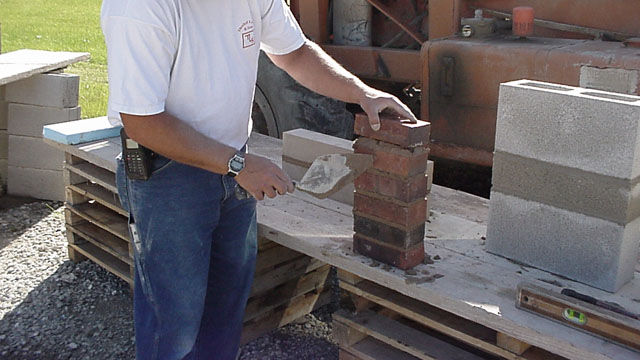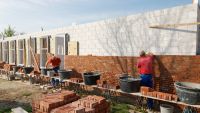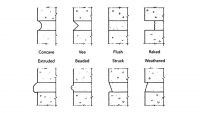July 10, 2000 10:30 AM CDT

The American Society for Testing and Materials (ASTM) has developed two distinct standards for testing masonry mortars. ASTM C 270 is a mortar specification which outlines procedures for testing mortar prepared in the laboratory. The purpose of the testing is to determine whether a mortar mixed with construction materials to specified proportions conforms with physical property requirements listed within the standard.
ASTM C 780 is a field test method which defines standard procedures for sampling and testing mortars before and during their use in construction. Mortars can be tested to determine composition or to obtain their plastic and harden properties. Test methods and procedures within this standard can be used to evaluate masonry mortars prepared in the laboratory prior to construction or to evaluate masonry mortars mixed at the job site. Field testing and sampling of mortar is used to verify consistency of materials and procedures, not mortar strength. Test results of masonry mortar obtained through field testing conducted in accordance with ASTM C 780 are not required to meet the minimum compressive strength values listed in the property specification of ASTM C 270.
Compressive strength values obtained from field testing of mortar can be expected to be lower and less consistent than values obtained in the laboratory. Laboratory prepared mortars are mixed with a quantity of water to produce a flow of 110 ± 5 percent. This quantity of water is not sufficient to produce mortar with a workable consistency suitable for laying masonry units in the field. Mortar for use in the field must be mixed with the maximum amount of water, consistent with workability, in order to provide sufficient water to satisfy the suction of the masonry units. The properties of laboratory prepared mortar with a required flow rate of 110 ± 5 percent are intended to approximate the flow and properties of field prepared mortar after it has been placed in contact with masonry units.
Field testing of mortar according to ASTM C 780 can be used to establish a quality control program for mortar produced during construction at the job site. The program should consist of both preconstruction and construction site evaluation. Preconstruction testing should be conducted to establish baseline values that can be expected during construction for the approved mortar mix design. Preconstruction testing and evaluation of mortar allows for comparisons of mortar produced in the laboratory to those mixed at the job site. Preconstruction evaluation establishes compatibility of individual constituents in the mortar and general physical characteristics of the mixture.
Construction site testing procedures establish a mortar's conformance to proportion specifications and monitors the consistency of mortar production. On-site testing makes evaluation of masonry mortars possible by sampling mortar at various stages of construction, and by performing tests on mortar in plastic and hardened states. The test results could verify data derived from preconstruction testing and could reflect variations in mortar performance characteristics resulting from batching during mortar production and use at the job site. If inconsistencies between preconstruction mortar composition and on-site mortar composition exist, immediate corrective action to modify mortar batching and mixing can be introduced.
Consistency
The consistency of field mortars is an indicator of batch-to-batch variations in mix materials and mixing time. Large variation in consistency readings is an indicator of poor control during mortar batching and mixing. However, erratic consistency does not indicate whether mortar materials are improper. The consistency of field mortars can be measured using a cone penetrometer as referenced in ASTM C 780. This device measures the depth of mortar penetration in millimeters. The values obtained can be used to verify that the consistency of each batch of mortar is the same. A consistency measurement of 55 millimeters is good for low-to-moderate suction masonry units, while a measurement of 65 to 70 millimeters is required for high suction masonry units.
Air Content
Repetitive testing to determine mortar air content indicates changes caused by variations in mixing consistency and in mixing time. The air content of field mortars can be measured by using a pressure meter or by using a "roll-o-meter" as indicated in ASTM C 780 Annex A.6. The pressure meter is easier to use in the filed, but the "roll-o-meter" is more accurate.
Water Retention
Water retention measures the plastic life and workability of mortar. Mortars with sufficient water retention allow the mason time to set and adjust the mortar and masonry unit before the mortar begins to harden. A water retention test indicates a mortar's ability to retain mixing water after being exposed to suction from a masonry unit. Water retention tests must be performed in the laboratory.
Board Life
Board life is the time frame in which a masonry mortar can be used after it is removed from the mixer and placed on the mason's mortar board. Once mortar is placed on a board, it begins to stiffen through loss of water and harden through normal setting of cement. If mortar begins to stiffen before it is placed in usage, bonding will be negatively affected. The method for measuring board life is indicated in ASTM C 780 Annex A.3. This method is useful for determining whether a mortar is acceptable or unacceptable due to stiffness.
Mortar-Aggregate Ratio
Repeated testing for mortar aggregate ratio can indicate a mixer operator's ability to properly and consistently add the cementitious materials and sand to the mixer and can determine batch-to-batch variations in mortar composition. The method for determining mortar-aggregate ratio is indicated in ASTM C 78 Annex A.4. The test is performed by obtaining a representative dry sample of mortar mix from the job site and performing a series of calculated measurements in the laboratory. However, the sieving operation utilized during this test is not capable of separating an individual cementitious material when more than one material is used.
Compressive Strength
Compressive strength tests of mortar prepared in the field reflect approximate mortar strengths. Samples of field mortar are retrieved in molded cylinders or cubes and delivered to the laboratory for testing. The methods for compressive strength tests are indicated in ASTM C 780 Annex A.7. The values obtained from testing are not to be compared with strength requirements listed in ASTM C 270 or with compressive values obtained from preconstruction testing.
Field Testing of Mortar
Establishing a quality control program for mortars

Mortar samples are prepared in job site conditions. After the sample is complete, it is removed from the brick and sent to a testing lab.
The American Society for Testing and Materials (ASTM) has developed two distinct standards for testing masonry mortars. ASTM C 270 is a mortar specification which outlines procedures for testing mortar prepared in the laboratory. The purpose of the testing is to determine whether a mortar mixed with construction materials to specified proportions conforms with physical property requirements listed within the standard.
ASTM C 780 is a field test method which defines standard procedures for sampling and testing mortars before and during their use in construction. Mortars can be tested to determine composition or to obtain their plastic and harden properties. Test methods and procedures within this standard can be used to evaluate masonry mortars prepared in the laboratory prior to construction or to evaluate masonry mortars mixed at the job site. Field testing and sampling of mortar is used to verify consistency of materials and procedures, not mortar strength. Test results of masonry mortar obtained through field testing conducted in accordance with ASTM C 780 are not required to meet the minimum compressive strength values listed in the property specification of ASTM C 270.
Compressive strength values obtained from field testing of mortar can be expected to be lower and less consistent than values obtained in the laboratory. Laboratory prepared mortars are mixed with a quantity of water to produce a flow of 110 ± 5 percent. This quantity of water is not sufficient to produce mortar with a workable consistency suitable for laying masonry units in the field. Mortar for use in the field must be mixed with the maximum amount of water, consistent with workability, in order to provide sufficient water to satisfy the suction of the masonry units. The properties of laboratory prepared mortar with a required flow rate of 110 ± 5 percent are intended to approximate the flow and properties of field prepared mortar after it has been placed in contact with masonry units.
When to Require Field Testing
Field testing of mortars is not a mandatory MSJC Code requirement, but is an option left to the discretion of the specifier. Specifying ASTM C 780 field testing to determine whether the physical properties of a mortar are in compliance with those listed in ASTM C 270 is not appropriate. Also, it would not be appropriate to require field testing to verify structural performance of mortar or of a masonry assemblage.Field testing of mortar according to ASTM C 780 can be used to establish a quality control program for mortar produced during construction at the job site. The program should consist of both preconstruction and construction site evaluation. Preconstruction testing should be conducted to establish baseline values that can be expected during construction for the approved mortar mix design. Preconstruction testing and evaluation of mortar allows for comparisons of mortar produced in the laboratory to those mixed at the job site. Preconstruction evaluation establishes compatibility of individual constituents in the mortar and general physical characteristics of the mixture.
Construction site testing procedures establish a mortar's conformance to proportion specifications and monitors the consistency of mortar production. On-site testing makes evaluation of masonry mortars possible by sampling mortar at various stages of construction, and by performing tests on mortar in plastic and hardened states. The test results could verify data derived from preconstruction testing and could reflect variations in mortar performance characteristics resulting from batching during mortar production and use at the job site. If inconsistencies between preconstruction mortar composition and on-site mortar composition exist, immediate corrective action to modify mortar batching and mixing can be introduced.
Interpreting Field Test Methods
ASTM C 780 outlines procedures for measuring physical properties of plastic mortar such as consistency, air content, water retention and board life. It also defines methods for obtaining the aggregate ratio and water content of freshly mixed mortar, a procedure that can be used to verify the accuracy of site proportioning of mortars. Procedures for measuring properties of hardened mortars, such as compressive strength, are also defined.Consistency
The consistency of field mortars is an indicator of batch-to-batch variations in mix materials and mixing time. Large variation in consistency readings is an indicator of poor control during mortar batching and mixing. However, erratic consistency does not indicate whether mortar materials are improper. The consistency of field mortars can be measured using a cone penetrometer as referenced in ASTM C 780. This device measures the depth of mortar penetration in millimeters. The values obtained can be used to verify that the consistency of each batch of mortar is the same. A consistency measurement of 55 millimeters is good for low-to-moderate suction masonry units, while a measurement of 65 to 70 millimeters is required for high suction masonry units.
Air Content
Repetitive testing to determine mortar air content indicates changes caused by variations in mixing consistency and in mixing time. The air content of field mortars can be measured by using a pressure meter or by using a "roll-o-meter" as indicated in ASTM C 780 Annex A.6. The pressure meter is easier to use in the filed, but the "roll-o-meter" is more accurate.
Water Retention
Water retention measures the plastic life and workability of mortar. Mortars with sufficient water retention allow the mason time to set and adjust the mortar and masonry unit before the mortar begins to harden. A water retention test indicates a mortar's ability to retain mixing water after being exposed to suction from a masonry unit. Water retention tests must be performed in the laboratory.
Board Life
Board life is the time frame in which a masonry mortar can be used after it is removed from the mixer and placed on the mason's mortar board. Once mortar is placed on a board, it begins to stiffen through loss of water and harden through normal setting of cement. If mortar begins to stiffen before it is placed in usage, bonding will be negatively affected. The method for measuring board life is indicated in ASTM C 780 Annex A.3. This method is useful for determining whether a mortar is acceptable or unacceptable due to stiffness.
Mortar-Aggregate Ratio
Repeated testing for mortar aggregate ratio can indicate a mixer operator's ability to properly and consistently add the cementitious materials and sand to the mixer and can determine batch-to-batch variations in mortar composition. The method for determining mortar-aggregate ratio is indicated in ASTM C 78 Annex A.4. The test is performed by obtaining a representative dry sample of mortar mix from the job site and performing a series of calculated measurements in the laboratory. However, the sieving operation utilized during this test is not capable of separating an individual cementitious material when more than one material is used.
Compressive Strength
Compressive strength tests of mortar prepared in the field reflect approximate mortar strengths. Samples of field mortar are retrieved in molded cylinders or cubes and delivered to the laboratory for testing. The methods for compressive strength tests are indicated in ASTM C 780 Annex A.7. The values obtained from testing are not to be compared with strength requirements listed in ASTM C 270 or with compressive values obtained from preconstruction testing.
Summary
Establishing a quality control program for mortars by requiring field tests in conformance with ASTMC C 780 can be beneficial. Field testing mortar can provide valuable information of properties and characteristics of mortar prepared at the job site. However, the information obtained through this testing should be used to modify the consistency of mortar mixed in the field and not to condemn a mortar based on previously obtained results.About the Author
Robert L. Nelson is President of Robert L. Nelson & Associates, Inc. Construction Materials Laboratory.


















